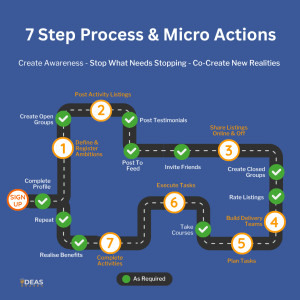Beyond Left and Right
Section 1 - Header
Section 2 - Top 100 Rating
You must be logged in to rate.
Section 4 - Detailed Info
Why Political Labels Fail Humanity — and What Comes Next
Part 1: The Problem of Labels
Human beings love labels. We have always reached for simple words and categories to make sense of a complex world. In politics, these labels are everywhere. Democrat or Republican. Labour or Conservative. Liberal or Conservative. Woke or anti-woke. Communist or fascist. Green or Reform. The list grows endlessly, a shorthand vocabulary that supposedly tells us who we are and who our enemies are.
But beneath this neat packaging lies a dangerous illusion: that choosing a label equals choosing truth, and that our political identity is who we are.
This isn’t new. The history of politics has always been the history of tribes. When the French Revolution produced the terms “left” and “right” based on where delegates sat in the National Assembly, it wasn’t just a seating chart — it was a signal of allegiance. To sit on one side was to declare your loyalty to a worldview.
Since then, the same tribal sorting has echoed around the globe. In Britain, politics crystallised into Labour versus Conservative. In America, Democrat versus Republican. Elsewhere, other binaries emerged. Wherever humans gather, they seem compelled to divide into “us” and “them.”
This makes psychological sense. Neuroscience shows we are wired for in-group and out-group dynamics. Belonging to a tribe offered evolutionary safety; rejection meant danger. In modern life, politics fills that primal need. The label on your chest becomes a badge of identity, and attacking the “other side” becomes proof of loyalty.
But there’s a cost. Labels flatten reality. They reduce complex issues into binary camps. They erase nuance, silence dissent within groups, and transform disagreement into existential warfare.
Take “woke.” For some, it means awareness of systemic injustice. For others, it’s a slur implying overreach and censorship. The word has mutated into a weapon, lobbed across divides until it means almost nothing — except a signal of which tribe you despise.
Or consider “fascist” and “communist.” These were once precise ideological terms. Today, they are often hurled at anyone who disagrees strongly, regardless of their actual beliefs. The words lose meaning, yet the venom remains.
In such an environment, politics becomes less about solving problems and more about proving allegiance. Complex realities are forced into yes/no, for/against binaries. If you want to belong, you must pick a side. Sometimes, you may feel you have no safe choice but to comply with one or the other — even when neither truly reflects your values.
The result? A politics of performance, not solutions. We argue endlessly over labels, but the problems pile up.
Part 2: Who Is “Right”?
At this point, the obvious question arises: who is actually right? Which label, which ideology, which tribe offers the “best” option for humanity?
The honest answer: none of them.
Every political tradition contains insights. Every ideology has produced both progress and harm. None hold the monopoly on truth. The world is too complex to be governed by a single lens.
Take economic policy. Free-market advocates emphasize innovation and efficiency. They are right that markets unleash creativity. Yet unchecked markets breed inequality, exploitation, and crisis. Socialists emphasize fairness and redistribution. They are right that inequality corrodes society. Yet unchecked collectivism can stifle initiative and create dependency. Neither “side” alone solves the puzzle; both hold fragments of truth.
Consider healthcare. In the United States, Democrats push for more public provision; Republicans resist. In reality, the system is broken not because one side is right and the other wrong, but because healthcare is a wickedly complex challenge. It requires balancing cost, access, innovation, and fairness — none of which can be resolved by chanting party slogans.
Climate change offers another example. Greens warn of catastrophe and push radical reform. Conservatives often resist, fearing economic harm. Yet neither alone has a workable plan. Radical reform without economic pragmatism risks collapse. Resistance without adaptation risks disaster. The real solution must integrate insights from both: urgency with realism, ambition with pragmatism.
Even cultural debates show the same pattern. Progressives champion inclusion and rights. Conservatives champion tradition and order. Both values matter. Societies need freedom to evolve and anchor points to endure. To privilege one side absolutely is to unbalance the ship.
This is why politics based on labels fails. No label contains the whole truth.
The tragedy is that labels turn partial truths into total identities. Instead of combining insights, we weaponise them. Instead of collaboration, we choose combat. Instead of asking, “What works?” we ask, “What would my side approve?”
When reality doesn’t fit the binary, we twist reality. Thus, climate science becomes a partisan issue rather than a matter of survival. Poverty becomes a culture war, not a human crisis. Even public health becomes a battlefield.
So who is right? None of them. Or perhaps more accurately, all of them — but only in fragments. Humanity suffers because we keep mistaking fragments for the whole.
Part 3: Why This Method Fails
The method of politics-as-tribal-labels fails us for structural reasons.
First, it creates winners and losers. In every election, one side claims victory and the other defeat. But most problems are not solved by one faction conquering another. They require cooperation. A government may pass laws, but without cross-societal buy-in, those laws falter.
Second, it incentivises performance over progress. Politicians know that labels matter more than nuance. So they posture, signaling loyalty to their base rather than seeking genuine compromise. The result is gridlock.
Third, labels are weaponised by media and corporations. Outrage sells. Division drives clicks. Simplistic binaries keep audiences hooked. A world run on algorithms rewards the most extreme tribal signals, drowning out moderation and complexity.
Fourth, the system leaves ordinary people feeling abandoned. Millions look at their options and conclude: no one represents me. They see parties converging on power, not principle. They watch the same problems persist: inequality, housing shortages, environmental degradation, healthcare crises. The tribe wins elections, but the people lose faith.
Fifth, labels corrode trust. When everyone is sorted into camps, empathy dies. If your neighbour wears the wrong badge, they become enemy, not fellow citizen. In such a climate, cooperation becomes nearly impossible.
The deepest failure, however, is this: political tribalism makes us forget the real purpose of politics. Politics should be about problem-solving. About identifying what isn’t working in our lives and communities, and fixing it together. Instead, politics becomes a never-ending fight for control.
As one might put it: politics today is a struggle for power, not a collaboration for solutions.
This failure explains the current disillusionment sweeping the world. Voter turnout declines. Trust in government erodes. Young people, in particular, turn away from traditional parties. They sense instinctively that the old method doesn’t work.
But if the current system fails, what comes next?
Part 4: Now What? A New Way Forward
Rejecting tribal labels does not mean rejecting politics altogether. It means redefining politics — not as a contest of identities, but as a shared process of ambition and problem-solving.
The key is to shift from ideology to outcomes. Instead of asking, “Which side am I on?” we ask, “What do we want to achieve?”
This is the heart of the Ambition Economy: replacing tribal politics with collaborative ambition.
Imagine a system where the starting point is not party allegiance but shared outcomes. A healthier community. A fairer economy. A sustainable environment. A thriving culture. Instead of organising around labels, we organise around ambitions.
From there, we break ambitions into practical actions. We build coalitions not of “left” and “right” but of people committed to specific results. We measure progress by delivery, not by tribal victories.
This is where the Ambition OS comes in: Decide → Post → Share → Build → Plan → Execute → Deliver.
Instead of waiting for politicians, ordinary people use this framework to act. They decide on an ambition. They post it publicly. They share it to build support. They plan and execute micro-actions. They deliver measurable results.
Such a system cuts across labels. Climate action, for instance, need not be “left” or “right.” It is an ambition to safeguard the planet. Housing reform need not be socialist or capitalist. It is an ambition to ensure shelter. Healthcare reform need not be partisan. It is an ambition to keep people alive and well.
The beauty of ambition-driven collaboration is that it integrates insights from multiple traditions. The innovation of markets, the fairness of redistribution, the stability of traditions, the dynamism of progress — all can be woven into solutions when we stop reducing ourselves to labels.
Critics will say this is idealistic. Perhaps. But what is the alternative? A politics of endless division, paralysis, and decline? A world burning while factions argue over whose label is right?
The truth is, humanity already collaborates beyond labels when the stakes are high enough. During disasters, neighbours help neighbours regardless of party. In scientific research, international teams work across ideologies. During the pandemic, despite failures, global collaboration saved millions.
The challenge is to make this collaborative spirit the norm, not the exception. To build systems — digital, cultural, institutional — that reward ambition and delivery over identity and division.
In short, the future must be post-label politics. Not left, not right — forward.
After the Labels
Political labels once helped humanity navigate. They offered clarity in an uncertain world. But today, they divide more than they unite, obscure more than they reveal, and hinder more than they help.
None of them — Democrat or Republican, Labour or Conservative, woke or anti-woke, fascist or communist — is fully “right” for the world. At best, they hold fragments of truth. At worst, they become cages that lock us into endless cycles of conflict, and despair.
The real question is not “Who is right?” but “What works?” What ambitions do we share, and how can we deliver them together?
We are at a crossroads. We can continue clinging to old labels, fighting tribal battles while crises mount. Or we can step into a new way of thinking: ambition-driven, collaborative, focused on results.
The world doesn’t need more partisanship. It doesn’t need Labour. Nor the Conservatives. Nor the Democrats. Not even the Republicans. It needs solutions. It doesn’t need more labels. It needs delivery. It doesn’t need more tribes. It needs humanity working together.
So let’s stop asking, “Which side are you on?” and start asking, “What can we build, together?”
Because in the end, the only side that matters is the side of progress.
Section 5 - Media
Section 6 - Next Steps
Section 7 - Location
Section 8 - Interest Areas
Section 10 - Contact Details
Section 11 - Listing Reviews
Login to Write Your ReviewThere are no reviews yet.



